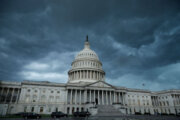Editor’s note: This article is part of a report examining what Hong Kong’s national security law reveals about China’s global ambitions, its impact on other countries and the human voice of what it means to create a new home in the world.
“It’s going bad pretty quick.” So says Reese, of the climate of anxiety and fear in Hong Kong since last year’s enactment of a national security law tailored specifically for the special administrative region in China. The legislation makes any act or spoken word in Hong Kong that Beijing regards as subversion, secession, terrorism or collusion with foreign forces punishable by up to life in prison.
The fear Hong Kong residents have of retaliation against themselves or their relatives is so strong that few people contacted agreed to speak, and when they did, it was often only under certain conditions. Reese, for example, spoke on condition of using a pseudonym.
Migration out of Hong Kong has sharply increased since the pro-democracy protests of 2019 and 2020 and subsequent government crackdowns on civil liberties. As a result, nearly 90,000 residents have left the territory from June 2020 to this past June, marking the largest drop in Hong Kong’s population since 2003, when severe acute respiratory syndrome, or SARS, broke out across Hong Kong and mainland China.
[READ: Hong Kong Crackdown a Part of China’s Larger Strategy]
The migrants who have made the decision to leave have primarily relocated to the United Kingdom, Australia and the United States. For those holding British National Overseas passports, orBNOs, Prime Minister Boris Johnson has offered resident visa status in the U.K. as a response to the security law, which has sparked protests from Western governments.
In many ways, Reese is symbolic of the first wave of Hong Kong emigres — young professionals who can quickly secure employment, or families whose parents want to provide education that prioritizes independent critical thinking. A 25-year-old administrative assistant, Reese cited the Hong Kong government’s proposed extradition bill as impetus for his decision to move in October 2020 to the U.K. permanently under the BNO program. In the spring of 2019, the government proposed a law that would enable territory officials to extradite suspects to mainland China, a move that triggered massive public protests in the summer. The government eventually withdrew the bill.
“(The extradition bill) just let me know that the government isn’t really listening to the people,” Reese said. “And even though we did (speak) out, our voice doesn’t matter to them. So that’s the first point (that) I realized that Hong Kong’s not going where I think it would be going.”
He also says the proposal of the national security bill also signaled to him that Hong Kong’s “atmosphere was already changing.” China’s top legislative body passed the law on June 30, 2020.
“(People are) afraid that they’re going to be arrested or they’re going to be questioned about something that they did or that people may come after them because of something they said online,” he said. “That may be the critical point why I decided to leave Hong Kong.”
More Departures Expected in Coming Years
The money leaving Hong Kong also signals the urgency with which people are fleeing. More than $1.9 billion has been pulled out of pension funds from the first quarter of 2019 to the second quarter of 2021, according to data from the Mandatory Provident Fund, Hong Kong’s mandatory pension plan.
Since most countries require proof of no criminal record before granting entry, the number of certifications the Hong Kong police has issued of no criminal convictions — known in colloquial Cantonese as “clean sheets” — has soared. The number issued this past June is more than double the amount of requests in January 2017.
Dennis Kwok, an Asia Fellow at Harvard’s Kennedy School and a former lawmaker in Hong Kong, says he believes more people may want to leave the territory than presently are.
“I think more will leave either this year or the next three, because I think some people are still concerned about COVID,” he says. “So they want the situation to be back on track before going to the airport.”
[MORE ON HONG KONG: Hong Kong Residents Moving En Masse to the U.K.]
Some groups of people are migrating out of Hong Kong in greater droves than others. While the BNO passport route to migration is fairly accessible — according to Julian Chan, the co-founder of Hongkongers in Britain, an organization that helps Hong Kong expatriates assimilate in the United Kingdom — BNO applicants still need to pay government fees of about 7,000 British pounds (about $9,600) a head over five years and show they can support themselves for six months after moving.
According to a study from Hongkongers in Britain, the majority of the 315 respondents who were prospective emigrants are relatively young, wealthy professionals seeking better futures for their children. The typical respondent was 37 years old earning 52% above the median income in Hong Kong, and 90% of respondents reported wanting to emigrate from Hong Kong within the next three years.
While most of the respondents were relatively well-off and college-educated, they came from a variety of industries — with 43% from the financial services, insurance, banking and business administration industries. The rest reported working in engineering and science, hospitality, tourism or the arts and culture sectors.
Despite the financial requirements, Chan classifies the BNO visa “as a lifeboat scheme, and not so much an economic migration scheme.”
“There is actually no minimum threshold, as long as they can prove that they can sustain themselves for six months,” Chan explained. “It’s a very low amount of money, to be honest. Generally, most people, even those who cannot really afford it, can still consider it. They’re still eligible for it as long as they can provide these six months.”
‘Looking Over Your Shoulder All the Time’
Some of the first to leave the territory were pro-democracy activists and lawmakers fleeing persecution — such as Ted Hui, a former pro-democracy lawmaker who represented the Chung Wan constituency in the Central and Western District Council. Hui served as the Legislative Councillor for the Hong Kong Island constituency before moving to Denmark in November 2020 and then permanently resettling in Australia.
Hui was an active participant in the pro-democracy protests that swept the streets of Hong Kong in 2019, despite warnings that staying in Hong Kong could be dangerous for him and his family.
“As a lawmaker, I felt responsible for marching with people and to stay in the street to protect them, at least to show spirit that I’m with them, so I didn’t have any idea of leaving at all (at that time),” he said.
Things changed for Hui in June 2020 when Beijing introduced the national security bill in Hong Kong. After that, he was arrested three times — in September, October and November — for what he calls “ridiculous charges” while suspecting that he and his family were being followed by intelligence forces, ultimately leading him to believe that their personal safety was at risk.
“When it came to October and November, I made up my mind that I should just go, because I felt like I can speak freely, and I can do more when I’m away from Hong Kong — that’s why I decided to leave,” he said.
Crackdowns on the freedom of the press have also pushed journalists to move. In June of this year, Apple Daily — Hong Kong’s last remaining major pro-democracy newspaper — shut its doors following pressure from the government and the arrest of its owner, outspoken critic of Beijing Jimmy Lai, in August of 2020 under the national security law.
Steve Vines — a British expatriate economist for both Apple Daily and Radio Television Hong Kong, Hong Kong’s public broadcasting service, until he moved back to the U.K. in July of this year — says that his final days in the territory reflected that Hong Kong’s “direction of travel was very clear and the space for freedom of expression has diminished.”
Courtesy of the Associated Press
“The reason I came to Hong Kong was that it was considered in the Far East or Southeast Asian region to be the freest place to report,” he said. “You’d go somewhere else and there would be problems — you’d be threatened with arrest, deportation, lack of access to elementary things which journalists expect to have access to. So I’ve come to accept that being in Hong Kong was a wonderful thing in the context of the region because it was uniquely free.”
Now, after seeing some of his colleagues arrested, Vines recognized that he needed to leave Hong Kong because being a public figure there posed a threat to his safety.
“By the day, literally, the space for freedom of expression is dwindling,” he said. “On one level it’s depressing. On the other level it’s intimidating. But overall, I think it’s working under that dark shadow all the time, looking over your shoulder all the time.”
He recalls journalists in the newsroom having to make “elaborate arrangements to communicate with each other so that they weren’t spied upon” by senior management at RTHK, executives who insisted the organization’s archives should be purged to avoid any clash between previous reporting and current party lines, according to Vines. In order to protect their jobs and avoid arrest, Vines said he and his colleagues would communicate via encrypted networks or outside of the office and carefully monitor what they stored on their electronic devices out of fear that their materials would be seized if they were arrested and their contacts would be compromised.
“I would say (there was) a nervous atmosphere, a worried atmosphere (in the newsroom),” Vines said. “People were angry. I was extremely angry in my last days there.”
‘I Still Have Hope Because I Can See That People Are Awake’
While many fleeing Hong Kong have been pro-democracy activists, lawmakers and outspoken public figures, the migrants are also families — especially in response to the pro-Chinese Communist Party curriculum changes and culture of spying recently implemented in Hong Kong schools, with students and teachers encouraged to report one another to police hotlines for disloyalty.
For those reasons, Kwok says that much of the migration out of Hong Kong is from “parents with young kids who want a better education for their children, especially a liberal education, who want to go and get them a better future.”
Chan says he doesn’t see this wave being the end of the mass migration out of Hong Kong.
“The biggest wave obviously is within the first year, but I don’t see any slowing down anytime soon because people are indeed very worried in Hong Kong,” Chan said. “And as long as China kind of continues its actions in Hong Kong, people will want to (leave).”
While Hui believes Hong Kong has a “long dark age” to go through before changing direction back toward democracy, he still holds out hope for his native home’s future.
“I can see that people are awake,” he said. “They’re not sleeping like before 2019, before the freedom movement. In the past I felt frustrated because the important issues and human rights abuses were arising every day but people didn’t really care. Those who never cared about politics or current issues — they are all (awakened). The general public knows exactly what they are deprived of.”
More from U.S. News
Photos: Hong Kong Protests Carrie Lam’s China Extradition Bill
Hong Kong Residents Moving to the United Kingdom After China Crackdown
Hong Kong Crackdown Is Part of China’s Larger Global Strategy, Experts Say
Activists, Families and Young People Flee Hong Kong originally appeared on usnews.com






